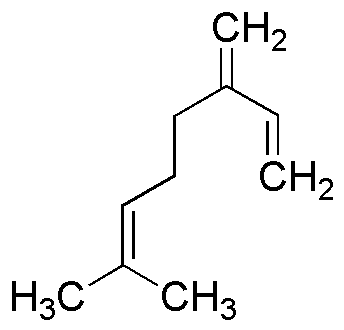Myrcene is widely utilized in research focused on:
- Fragrance and Flavor Industry: Myrcene is a key component in many essential oils and is used to create natural fragrances and flavors in perfumes, cosmetics, and food products. Its pleasant, earthy aroma enhances the sensory experience of various consumer goods.
- Pharmaceutical Applications: This compound has shown potential in the development of anti-inflammatory and analgesic medications. Researchers are exploring its therapeutic effects, making it a candidate for pain management solutions.
- Aromatherapy: Myrcene is often used in aromatherapy for its calming properties. It can be found in diffusers and essential oil blends, helping to reduce stress and promote relaxation in users.
- Biotechnology: In the field of biofuels, myrcene is being studied as a renewable energy source. Its conversion into biofuels can provide a sustainable alternative to fossil fuels, appealing to environmentally conscious industries.
- Food Preservation: Myrcene has natural antioxidant properties, which can be beneficial in food preservation. Its inclusion in packaging materials can help extend the shelf life of products by preventing spoilage.
General Information
Properties
Safety and Regulations
Applications
Myrcene is widely utilized in research focused on:
- Fragrance and Flavor Industry: Myrcene is a key component in many essential oils and is used to create natural fragrances and flavors in perfumes, cosmetics, and food products. Its pleasant, earthy aroma enhances the sensory experience of various consumer goods.
- Pharmaceutical Applications: This compound has shown potential in the development of anti-inflammatory and analgesic medications. Researchers are exploring its therapeutic effects, making it a candidate for pain management solutions.
- Aromatherapy: Myrcene is often used in aromatherapy for its calming properties. It can be found in diffusers and essential oil blends, helping to reduce stress and promote relaxation in users.
- Biotechnology: In the field of biofuels, myrcene is being studied as a renewable energy source. Its conversion into biofuels can provide a sustainable alternative to fossil fuels, appealing to environmentally conscious industries.
- Food Preservation: Myrcene has natural antioxidant properties, which can be beneficial in food preservation. Its inclusion in packaging materials can help extend the shelf life of products by preventing spoilage.
Documents
Safety Data Sheets (SDS)
The SDS provides comprehensive safety information on handling, storage, and disposal of the product.
Product Specification (PS)
The PS provides a comprehensive breakdown of the product’s properties, including chemical composition, physical state, purity, and storage requirements. It also details acceptable quality ranges and the product's intended applications.
Certificates of Analysis (COA)
Search for Certificates of Analysis (COA) by entering the products Lot Number. Lot and Batch Numbers can be found on a product’s label following the words ‘Lot’ or ‘Batch’.
*Catalog Number
*Lot Number
Certificates Of Origin (COO)
This COO confirms the country where the product was manufactured, and also details the materials and components used in it and whether it is derived from natural, synthetic, or other specific sources. This certificate may be required for customs, trade, and regulatory compliance.
*Catalog Number
*Lot Number
Safety Data Sheets (SDS)
The SDS provides comprehensive safety information on handling, storage, and disposal of the product.
DownloadProduct Specification (PS)
The PS provides a comprehensive breakdown of the product’s properties, including chemical composition, physical state, purity, and storage requirements. It also details acceptable quality ranges and the product's intended applications.
DownloadCertificates of Analysis (COA)
Search for Certificates of Analysis (COA) by entering the products Lot Number. Lot and Batch Numbers can be found on a product’s label following the words ‘Lot’ or ‘Batch’.
*Catalog Number
*Lot Number
Certificates Of Origin (COO)
This COO confirms the country where the product was manufactured, and also details the materials and components used in it and whether it is derived from natural, synthetic, or other specific sources. This certificate may be required for customs, trade, and regulatory compliance.


